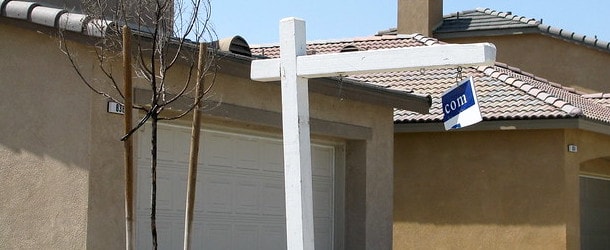For these of you continue to questioning why dwelling costs haven’t plummeted, regardless of considerably larger mortgage charges, it’s as a result of there isn’t a detrimental correlation.
Lots of people appear to suppose that dwelling costs and mortgage charges have an inverse relationship, nevertheless it merely isn’t true.
Simply have a look at historical past and also you’ll see that it’s completely regular for dwelling costs and rates of interest to rise.
Or for each charges and costs to fall in tandem. Finally, there isn’t a robust correlation both approach.
Nonetheless, dwelling gross sales definitely decelerate when the price of financing rises, as we’ve seen this 12 months.
Why Residence Costs Go Up In Spite of Greater Mortgage Charges

First off, let’s have a look at the present dynamic within the housing market. Each mortgage charges and residential costs have risen significantly over the previous 12 months and alter.
The 30-year fastened has climbed from round 3% to start out 2022 to 7.63% right this moment, per Freddie Mac weekly survey information.
Regardless of this greater than doubling in rates of interest, dwelling costs elevated 4.6% from July 2022 to July 2023, per the FHFA’s newest seasonally adjusted month-to-month Home Worth Index (HPI).
That is larger than the annual progress fee since 1991, which looks like a head-scratcher. How may dwelling costs outperform with mortgage charges surging?
Effectively, larger mortgage charges typically point out that the economic system is sizzling, which it most definitely has been over the previous 12 months and alter.
Extra jobs and elevated wages, coupled with a low rate of interest atmosphere, elevated the cash provide and led to much more shopper spending and a rise in costs, dwelling costs included.
Sadly, this additionally resulted in excessive inflation, which is why the Fed has raised its personal coverage fee 11 instances since early final 12 months.
However this financial power is what continues to propel dwelling costs larger, coupled with a extreme lack of for-sale stock.
So should you’re questioning why 8% mortgage charges haven’t sunk the house costs, now you already know.
Gross sales Quantity Will get Crushed When Mortgage Charges Rise

Alternatively, when mortgage charges improve considerably, dwelling gross sales are inclined to take a giant hit.
This occurs for apparent causes, the primary one being a scarcity of affordability. Fewer dwelling consumers can qualify when financing prices are prohibitively excessive.
Positive, of us have seen their wages improve they usually might need a very good job, however their DTI ratios aren’t what they was once.
Per NAR, whole existing-home gross sales fell 2.0% in September from August to a seasonally adjusted annual fee of three.96 million.
Gross sales had been down 15.4% year-over-year from 4.68 million in September 2022, and at the moment are at their lowest gross sales tempo since October 2010.
For reference, present dwelling gross sales exceeded the six million mark again in 2021, the very best stage since 2006.
In the meantime, the stock of unsold listings was up 2.7% in September from a month earlier, totaling 1,130,000 properties on the market.
However provide was off 8.1% in contrast with September of 2022, representing simply 3.4 months on the present gross sales tempo. That’s properly under NAR’s desired 6-month provide.
Nonetheless, regardless of much less demand and fewer consumers, the decrease variety of gross sales isn’t leading to decrease costs.
As an alternative, we merely have a housing market with low demand and low provide, and never quite a lot of budging from sellers on value.
That would change as time goes on, however even with mortgage charges round 8% we’ve but to see large value declines. And we would not.
When Mortgage Charges Surge Greater, Residence Costs Appear to Improve Even Extra

What’s maybe even stranger to the untrained eye is that when mortgage charges swing larger, dwelling costs appear to outperform.
That brings me to an fascinating piece written by Jonathan Lansner, who checked out dwelling costs and gross sales quantity in Southern California, and the impression of upper/decrease mortgage charges.
He discovered that median costs have appreciated 4.7% since 1988, however this annual acquire in Los Angeles averaged 7.6% when mortgages “had been of their steepest jumps.”
In the meantime, when mortgage charges “had been of their steepest drops,” LA median dwelling costs solely skilled 1.6% positive factors.
So that you’re telling me excessive mortgage charges fueled even larger dwelling costs. And declining mortgage fee resulted in falling dwelling costs?
Apparently, sure. As for why, it’s the economic system! Bear in mind, mortgage charges are inclined to rise when the economic system is doing properly.
They usually usually decline when the economic system goes downhill, or falls right into a recession, which some imagine is overdue at this level.
I wrote a bit some time again concerning this very matter and located that mortgage charges went down throughout each recession since 1980.
The one exception was the 1973-1975 recession, when 30-year fastened mortgage charges elevated barely from 8.58% to eight.89%.
With regard to jobs, Lansner famous that over the previous 35 years, employment grew 2.7% yearly in California when mortgage charges “surged,” however shrank at a 0.7% annual tempo when charges “tumbled.”
So perhaps simply perhaps, potential dwelling consumers will uncover that decrease mortgage charges are accompanied by decrease asking costs, probably in 2024.
Learn extra: Mortgage charges and residential costs can fall collectively.
